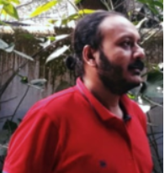Translated from the Bengali by Ranjita Chattopadhyay
Hoax
An old beggar became very surprised. She received a good amount of ration as relief. Rice, lentils, potatoes, salt and flour – altogether the supply weighed about 15 kilos. It was quite difficult for her to carry the heavy load of food all the way to her home. Still she made the effort. She walked for a bit and then stopped to catch her breath. She unloaded the sack by the roadside and picked it up again. A young girl was walking by. She was grumpy because she had not get her supply . As she spotted the old lady she started following her. As usual the old lady stopped after a while. The young girl immediately asked her, “Do you need any help carrying that load of yours?” A cloud of suspicion gathered in the eyes of the old beggar. The girl added, “ If you give me one kilo of flour I will carry it for you. I am not going to do it for free. Nor am I planning to run away with your supply.”
The old beggar agreed to her proposal. Together they kept on walking. After a while the girl asked her, “How many more miles till we reach your home?” The old lady got annoyed at her question. She replied, “You will get your share of flour. Don’t ask too many questions.” Quietly they kept on walking. After about half an hour both of them were exhausted. So they decided to stop at a rest area by the roadside. The girl repeated the same question. “Where is your home?”
“Why do you ask? Just be quiet and keep on walking.”
The girl became suspicious now. She said to the old lady, “I don’t need the flour anymore. I am leaving now. Find someone else to carry the load for you. I already came too far from my familiar surroundings.”
“Where will you go though? We have some food here. You can eat.”
“How am I supposed to eat those?”
“Why can’t you? Eat some flour and a few potatoes. If that does not sound good to you, try the salt.”
Hearing this the girl got very confused. “How will I cook the flour or the potatoes? Where is the oven? Where can I find the pots and pans?”
“Just eat them raw. I don’t cook my flour or potatoes.”
The girl stood up. She asked her one last time, “Where exactly do you live? Be specific. You must be crazy.”
“I don’t have a home. I wander around the streets. If I am sleepy, I find a shadowy place and lie down. When I get hungry I beg for food. Or eat whatever is available without cooking. What’s the need for all the arrangements of home and kitchen?”
Now the girl got nervous. She blurted out, “Are you a witch?”
The old lady started cracking up. She said, “You recognized me way too late. Come on now! Let me transform you into a chicken.”
The girl did not wait even for a second. She ran as fast as she could. Something was visible at a distance. It was somewhat blurry in the bright sun. What was that? A man or a dog? In the famine stricken country it was hard to distinguish.
What We Really Wanted
When food became scarce and nobody could restrain the monster called Hunger, the poor city dwellers heard a rumor which gave them relief. It was about a molasses pond located on the other side of the city. Word around the streets was that if someone drank the water from the pond, they would no longer be hungry. Slowly, the villagers began drinking water from this pond. Some even began jumping into it. Once they jumped in, life became peaceful. Actually, if someone could make themselves drown in the pond they had no more anxieties or worries about life.
Eventually, all the poor people in the city started walking towards the molasses pond. In the scorching sun they walked. They walked with babies across their chests. They carried their old and weak parents on their soldiers. All the poor people hit the road. The rich city folk saw the procession from their balcony and watched it on the news channel. They began to think, “The city is free of poor people” and they worried if their maids would not come anymore. The factories were quiet. The slogans demanding justice and fairness weren’t seen and protests weren’t heard. No more rickshaw pullers were on the streets. Even the tea and cigarette stall owners began walking towards the pond, where getting rid of hunger seemed almost guaranteed.
Life had not made these people anything but servants of the powerful monster called Hunger.
Finally, they had found a way to demolish the demon. Whoever went to the pond didn’t come back. They had tasted freedom. The Molasses pond offered a refuge for all of them.
When the poor city dwellers reached the pond, they saw a huge crowd around it. It seemed the entire population of the city was there. The rumor was that people from the other cities were also there.
However, now, no one was drinking from the water in a leisurely manner. Everyone was just jumping straight into the pond. Like a procession of ants, they were getting into the sap of the molasses pond with their family members. The joy of freedom! The pond was swallowing the hoard of hungry people in its endless belly.
Soon, there was not a single poor and hungry soul left in the city. They all drowned in the molasses pond to get rid of their hunger. The police informed the remaining people in the city that not a single dead body was found. Now, there was no one in the city who was poor or hungry. The city belonged only to the rich. With no one to work in the factories, sweep the roads, pull rickshaws, or serve as domestic help, the businessmen now faced a challenge.
The next day, a notice was seen posted to the walls of the factories and houses. “Your dues will be fully paid. You will get relief during the famine. Come back to work.” The message was also broadcast on the radio, TV, and social media. Despite this, no one came back from the peaceful depth of the molasses pond So, the rich people came together to construct a plan. What if they bought the molasses pond? Then they could drag out the poor workers from inside it.
Buffalo
A huge buffalo came into the village. It had long, curly horns. No one knew where it had come from. People thought the buffalo was a blessing. It came as an antidote to the virus, which caused this pandemic. Everyone said that if someone touched the buffalo, they would become immune from the virus. Poor buffalo! Everyone started touching him. They offered him food so he would settle in the village. That way, everyone could touch him.
One day, a virus-infected patient came to the buffalo in the middle of the night. Hugging the beast, he started wailing. He begged the buffalo to take his disease. As a result, within a few days every villager got infected by the virus and died. The buffalo left and arrived at another village. As soon as the villagers saw him, they left the village. The villagers said to themselves that the virus had taken the form of the buffalo. They wondered if the messenger of death came riding the buffalo. The buffalo left the deserted village and roamed to the next one.



























0 Comments